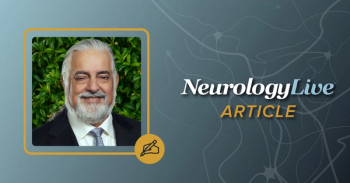
Intrathecal Mesenchymal Stem Cells as a Potential Treatment for Progressive Multiple Sclerosis: Saud A. Sadiq, MD, FAAN
The director and chief research scientist at Tisch MS Research Center of New York talked about a phase 2 data study on stem cell treatment for multiple sclerosis that was presented at the 2023 AAN Annual Meeting. [WATCH TIME: 7 minutes]
WATCH TIME: 7 minutes
“Essentially, what we did was [conduct] a 51-patient trial in which secondary progressive and primary progressive patients who are stable were given either placebo or 6 injections, spirally, of autologous bone marrow derived mesenchymal stem cells that were induced to become neuro progenitors."
Mesenchymal stem cell-neural progenitors (MSC-NPs), bone marrow-derived cells with trophic and immunomodulatory properties, may have therapeutic potential for patients with multiple sclerosis (MS). Recent findings from a phase 2 randomized, double-blind, placebo-controlled clinical trial (NCT03355365) suggest that intrathecal (IT)-MSC-NP treatment may correlate with therapeutic response in a subgroup of patients with MS.1
In the trial, 54 patients were categorized according to the Expanded Disability Status Scale (EDSS) (3.0-6.5) and two MS disease subtypes. With 3 patients dropping out, the cohort was randomized into either the treatment (n = 24) or placebo group (n = 27), receiving 6 IT injections of MSC-NPs or placebo every 2 months. The patients crossed over into the opposite group at the second year. The primary outcome was improvement in either EDSS, timed 25-foot walk or 9-hole peg test (EDSS Plus) and the secondary outcomes included the 6-minute walk test (6MWT), brain volume, and muscle strength. The research was conducted by senior author Saud A. Sadiq, MD, FAAN, and colleagues, and was presented at the
At the meeting, Sadiq, director and chief research scientist at Tisch MS Research Center of New York, sat down with NeurologyLive® in an interview to provide an overview of the clinical, along with detail on primary and secondary end point findings. He also talked about some of the positive outcomes observed in the trial regarding bladder function, spinal fluid biomarkers, and the walking test. In addition, Sadiq spoke of some of the limitations of the trial, and the potential avenues for future research in this field.
REFERENCES
1. Roche M, Malin M, Stark J, et al. Efficacy of Intrathecal Mesenchymal Stem Cell-Neural Progenitor Therapy in Progressive MS: Results from a Phase II Clinical Trial. Presented at: 2023 AAN Annual Meeting; April 22-27; Boston, MA. Abstract 005. MS Clinical Trails and Therapeutics session.
Newsletter
Keep your finger on the pulse of neurology—subscribe to NeurologyLive for expert interviews, new data, and breakthrough treatment updates.










